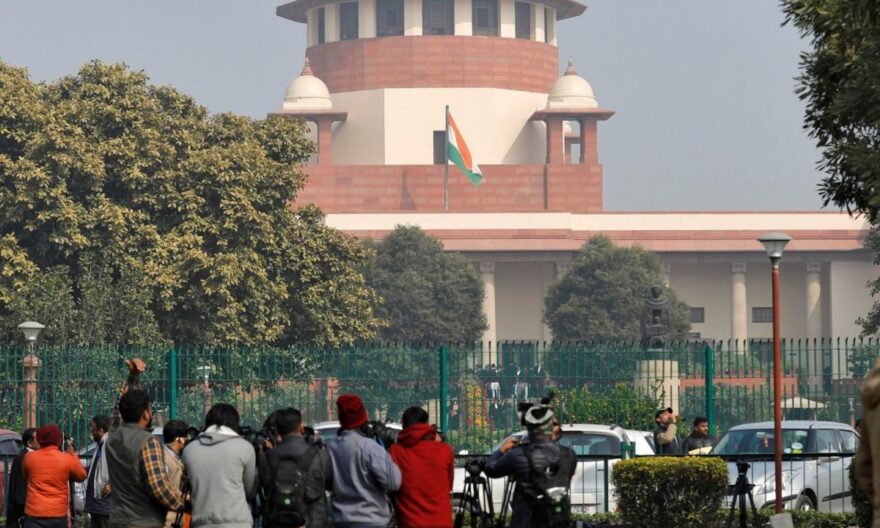
The Supreme Court on Monday ordered the Centre to make its stand clear on the viability of enacting a Uniform Civil Code (UCC) in the country within three weeks.
When addressing a number of petitions seeking uniformity in the laws governing succession, adoption, guardianship, and maintenance, a bench made up of the Chief Justice of India (CJI) U. U. Lalit and justice S. Ravindra Bhat noted that these issues are various “facets” of the UCC and instructed the Center to file its response on each aspect separately.
“These petitions are seeking common marriage, divorce, adoption, succession, and maintenance laws. What is the difference between these matters? They are all facets of the Uniform Civil Code, “the bench said.”
It also added, “Let a comprehensive response be filed, indicating the stand of the Union government in respect of the issues raised in this batch of petitions.”
Ashwini Kumar Upadhyay, a lawyer and BJP leaders, and Lubna Qureshi, another petition, have pointed out irregularities in the various divorce, marriage, succession, adoption, and support rules that apply to different religious.
In his plea, Upadhyay sought uniformity in the grounds on which divorce is granted. Adultery is a problem for Hindus, Christians, and Parsis but not for Muslims, he said.
Likewise, incurable leprosy is a ground of divorce for Hindus and Muslims but not for Christians and Parsis. Also, underage marriage is a ground of divorce for Hindus but not for Christians, Parsis, and Muslims, “he added.
In the case of adoptions, only Hindus have a codified law under which an adopted child has the right to inherit property and be recognised as a biological child of the adoptive parents, Upadhyay said. He said the case is not the same for Muslims, Christians, and Parsis.
Upadhyay’s petition also said women across religions ought to be treated equally. He said that religious practises which deny them their fundamental rights should not be protected.
“We are considering what response the Centre will file and what kind of judicial process we can issue in this matter. Assuming we might issue a mandamus (writ giving a direction), “Can we issue a mandamus itself is in question and also whether you intend to place such a bill in Parliament,” the bench said.
Appearing for the Centre, solicitor general Tushar Mehta said it would essentially be a question of law. “If need be, we will put in a reply in three weeks,” he said.
Opposing the pleas, the All India Muslim Personal Law Board and a Muslim woman, Amina Sherwani, filed intervention applications in the top court, alleging attempts were being made to bring in the UCC through the backdoor.
In appearing for the Muslim Personal Law Board, senior advocate Huzefa Ahmadi, along with advocate M R Shamshad, said Upadhyay, in 2015, had raised similar prayers in a writ petition filed in the top court, from which he withdrew.
The BJP leader later filed a petition seeking enforcement of the UCC before the Delhi high court, which is still pending, the lawyers said.
Huzefa told the bench that the petitioner should be asked to produce the record of his earlier plea because he had neglected to include this fact in the current batch of petitions.
Although the Supreme Court had previously encouraged the centre to consider creation a UCC, the judiciary has left it to the legislative branch’s wisdom rather than stepping into the purview of parliament.
Taking note of the submissions, the bench told Upadhyay: “You should be fair to this court. Check your petition and file the same before us on the next date of hearing. “
Upadhyay said his earlier petition was on implementing Article 44 of the Constitution, which says “the state shall endeavour to secure for the citizens a uniform civil code throughout the territory of India.”
I am not seeking UCC. In these petitions, I have endeavoured to show anomalies that exist in the country which make laws on marriage, divorce, adoption, maintenance, and succession apply differently to women of different religions. “This violates their fundamental rights under Articles 14 (equality), 15 (right against discrimination) and 21 (life and liberty),” he said.
To this, the bench said: “Even matrimonial issues are one of the facets of UCC.”
The Muslim Personal Law further let the court know that the same petitioner had preciously contested “nikah halal” and other types of Muslim marriage, and that he is currently pleading similar arguments before a constitution bench.
The court demanded information on the Supreme Court’s pending cases requesting uniform marriage laws and ordered that they be filled alongside the current batch of petitions.
The post SC seeks Centre’s reply on feasibility of Uniform Civil Code appeared first on The Daily Guardian.




